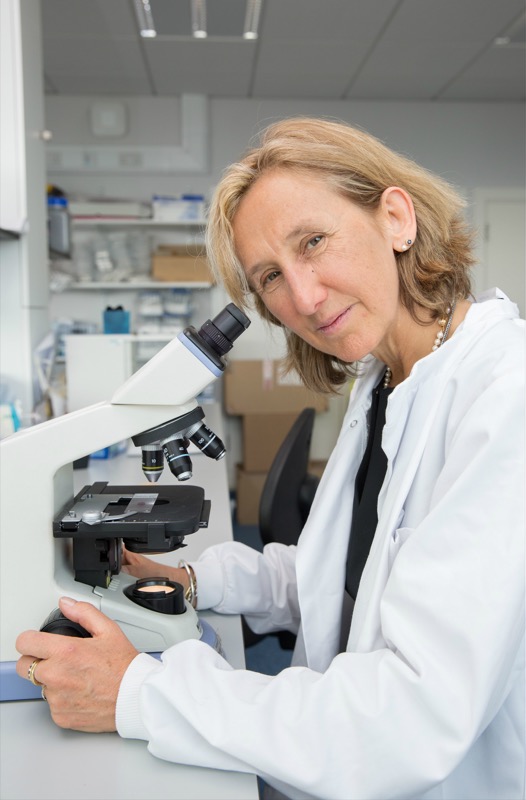Professor Orla Hardiman’s Inaugural Lecture Explores the Impact, Evolution and Research Landscape of Motor Neurone Disease in Ireland
Posted on: 15 September 2014
Orla Hardiman, Professor of Neurology, Trinity College Dublin, and Consultant Neurologist at Beaumont Hospital delivered her inaugural lecture yesterday evening, September 11th which looked at the landscape of Motor Neurone Disease (MND) in Ireland and how research, diagnosis and treatments for this condition have evolved. The event marked her appointment as the first Professor of Neurology in Ireland.
110 people are newly diagnosed with Motor Neurone Disease in Ireland each year with 300 patients and their families currently living with the condition.
In her lecture, Professor Hardiman discussed why the population structure of Ireland makes for an ideal research environment. She spoke about how the ground breaking work that is being carried out at the newly established Unit of Academic Neurology in Trinity, the first of its kind in Ireland, has contributed to a global understanding that MND is not a single condition, but a spectrum of conditions with different causes.

Professor Hardiman explained how Ireland as an island population with a higher degree of relatedness than other countries may affect our rates of MND and how epidemiology and genetic profiling research her team is conducting has shown that in countries where the population is very mixed, such a Cuba, the rates of MND are much lower than in Ireland. She pointed to genetic research into a new gene which affects 8% of Irish patients with MND, and described new discoveries by the TCD group that links the genetics of some forms of MND with psychiatric conditions.
Professor Hardiman also spoke about how the Trinity research contributes to a better understanding of the different evolution pathways of the disease, including how approximately 50% of people with MND in Ireland seem to be protected from developing thinking problems as a part of their symptom profile.
Focussing on the care of patients, Professor Hardiman talked about the importance of multidisciplinary clinics in improving patient outcomes, a model of care that was first proved in her research group and is now replicated throughout the world.
At the close of her lecture, Professor Hardiman discussed the future development of Research in the Academic Unit of Neurology and the importance of building career structures for clinician scientists. She announced a series of new fellowships and research bursaries in Trinity’s Unit of Academic Neurology in memory of the late RTE broadcaster Colm Murray, late Fine Gael T.D. Nicky McFadden and the late Michael Fitzpatrick, T.D.
She also announced the inauguration of a Clinician Scientist programme, supported by the generosity of the Iris O'Brien Foundation.
Speaking about the importance of building career tracks for clinician- scientists in Ireland Professor Hardiman said: “Well trained neurologists and dedicated clinician-scientists are essential to the translation of neuroscience research into new approaches to treatment. For Ireland to both contribute to and benefit from translational research, there is an urgent need to address the shortage of senior clinician-scientists and the deficit in this type of career training for clinicians in Ireland. I have been very fortunate in my own career, and am deeply grateful to the Health Research Board for supporting and facilitating my research. It is now time for me to help to build the careers of my incredibly talented younger colleagues.”

“The amazing generosity of our funders and the thousands of individuals engaged in so many individual and group fundraising initiatives through fashion shows, book sales, and of course the Ice Bucket Challenge, have made our new fellowships and bursaries a reality. I know that the recipients will join me and our research team in our objective to make a world that is free of MND. Given the talent and dedication of my own team, and our European friends and colleagues, I am very confident that we will succeed.”
In 2007 Professor Hardiman received a Health Research Board Clinician Scientist Award which enabled her to continue both her clinical work and to continue to engage in world class research. Speaking in advance of the inaugural lecture, Chief Executive of the Health Research Board, Dr Graham Love said: “Orla is a recognised international leader in MND research. She did not receive two HRB Clinician Awards by chance – she is excellent at what she does. I firmly believe our Clinician Scientists Awards are helping to keep some of Ireland’s best consultants here. It would be naïve to think Orla hasn’t had other offers. The fact this permanent professorial position has been established on the back of her two awards prove that HRB research awards have a big impact and contribute to patient care. This new position also means Orla will remain in Ireland and I know that patients, the research community and the health system will benefit as a result”
Facts and figures about MND and Neurological Disorders:
- 110 people are newly diagnosed with Motor Neurone Disease in Ireland each year with 300 patients and their families currently living with the condition.
- Ireland has the lowest ratio of Consultant Neurologists (34) per population in Europe –approximately 1:130,000 for the population of just under 5 million compared to a ratio of 1:8,000 in Italy; 1:25,000 in Holland, 1:33,000 in Portugal; 1:35,000 in Sweden and 1:38,000 in France.
- In Ireland, more than 700,000 people are living with neurological conditions of whom 90,000 are disabled and 25,000 need assistance for everyday living. 45,000 people are diagnosed with a new neurological condition every year.
- The WHO has noted that neurological conditions represent one of the single biggest challenges to health services in the 21s century. Age related conditions such as Cerebrovascular Disease, Alzheimers disease, Parkinsons Disease and Motor Neurone Disease lead to progressive degeneration of parts of the nervous system, with devastating consequences. Up to 30 million worldwide are currently affected by neurodegeneration, and within the coming 20 years, the frequency of neurodegenerative diseases is likely to increase by at least 230%.
